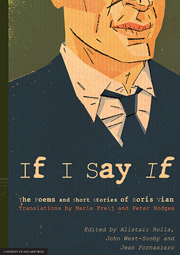Book contents
- Frontmatter
- Contents
- Foreword
- Boris Vian: A Life in Paradox
- Note on the Texts
- Part I The Poetry of Boris Vian
- Part II The Short Stories of Boris Vian
- And Other Short Stories… Boris Vian and Short Fiction
- Vian, in Short: An Ironic Take on the Art of the Short Story
- Part III On Translating Boris Vian
- Notes to the Poems
- Notes to the Short Stories
- Bibliography of Works Cited
Vian, in Short: An Ironic Take on the Art of the Short Story
from Part II - The Short Stories of Boris Vian
Published online by Cambridge University Press: 05 September 2014
- Frontmatter
- Contents
- Foreword
- Boris Vian: A Life in Paradox
- Note on the Texts
- Part I The Poetry of Boris Vian
- Part II The Short Stories of Boris Vian
- And Other Short Stories… Boris Vian and Short Fiction
- Vian, in Short: An Ironic Take on the Art of the Short Story
- Part III On Translating Boris Vian
- Notes to the Poems
- Notes to the Short Stories
- Bibliography of Works Cited
Summary
Of the many literary and artistic activities practised by Boris Vian, his production of short fiction is one of the least discussed, and this in spite of the success that many of his stories appear to have had at the time of their publication.
The occasion of this reconnection with the posthumously published short stories of Le Loup-garou (1970) and Le Ratichon baigneur (1981), in translation and thus for the first time for most English-speaking readers, is an opportune moment to analyse what is so often undervalued — Vian's skill as a short story writer.
Boris Vian as Short Story Writer
If this aspect of Vian's writing has been scarcely touched upon until now, it is probably because it was just one element of a broad-ranging literary output. As René Godenne has observed, the French short story of the twentieth century is not only less widely read than its nineteenth-century counterpart but, since it no longer corresponds to such a tightly defined genre, it is often considered almost a bastardised version of the novel. In fact, if the work of certain specialist short story writers of the last century is reasonably well known (we might think of Paul Morand, Marcel Arland, Marcel Aymé or Pierre Gripari), we are generally far less familiar with the short stories of those writers for whom this was not the principal format (such as François Mauriac, Louis Aragon, Romain Gary and, we might add, Boris Vian).
Information
- Type
- Chapter
- Information
- If I Say IfThe Poems and Short Stories of Boris Vian, pp. 277 - 296Publisher: The University of Adelaide PressPrint publication year: 2014
